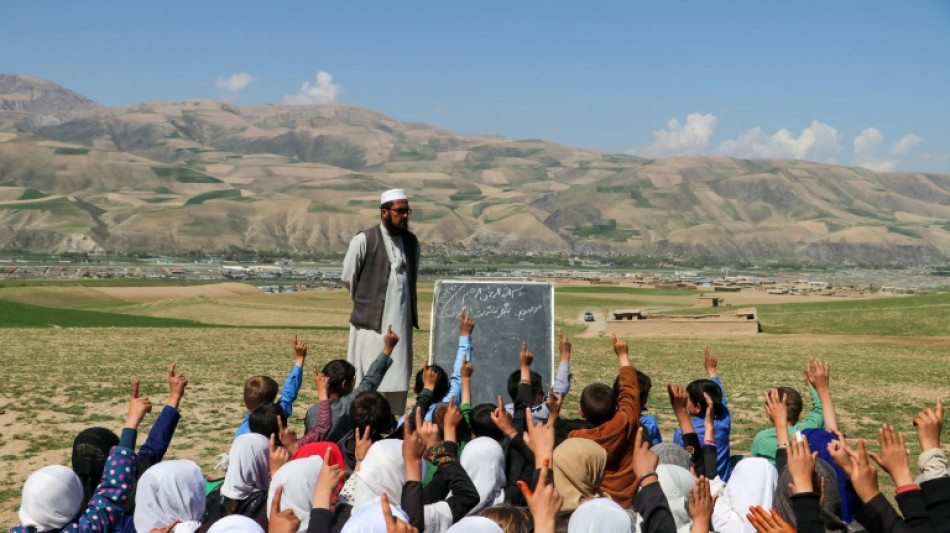
-
 Mitchell leads Cavs over T-Wolves
Mitchell leads Cavs over T-Wolves
-
O'Neil ends 'crazy few days' with Strasbourg cup canter

-
 Argentina wildfire burns over 5,500 hectares: governor
Argentina wildfire burns over 5,500 hectares: governor
-
Byrne late penalty fires Leinster into Champions Cup last 16

-
 Roma beat Sassuolo to close in on Serie A leaders Inter
Roma beat Sassuolo to close in on Serie A leaders Inter
-
Villa's FA Cup win at Spurs leaves Frank on the brink

-
 Osimhen focused on Nigeria glory not scoring record
Osimhen focused on Nigeria glory not scoring record
-
Undav calls shots as Stuttgart thump Leverkusen

-
 Venezuelan prisoners smile to hear of Maduro's fall
Venezuelan prisoners smile to hear of Maduro's fall
-
Thousands of Irish, French farmers protest EU-Mercosur trade deal

-
 Kiplimo captures third straight world cross country title
Kiplimo captures third straight world cross country title
-
Osimhen leads Nigeria past Algeria into AFCON semi-finals

-
 Weekend of US protests after woman killed by immigration agent
Weekend of US protests after woman killed by immigration agent
-
Monaco cling on with 10 men to avoid French Cup shock

-
 Rooney close to tears as brother masterminds FA Cup history
Rooney close to tears as brother masterminds FA Cup history
-
Semenyo scores on Man City debut in 10-goal rout of Exeter

-
 Villarreal sink Alaves to stay in La Liga hunt
Villarreal sink Alaves to stay in La Liga hunt
-
Bristol, Glasgow reach Champions Cup last 16

-
 Freiburg beat 10-man Hamburg to climb to eighth in the Bundesliga
Freiburg beat 10-man Hamburg to climb to eighth in the Bundesliga
-
Venezuela loyalists to rally one week after Maduro's capture

-
 Football: Five memorable FA Cup upsets
Football: Five memorable FA Cup upsets
-
Odermatt warms up for Winter Games with Adelboden giant slalom win

-
 Benin showcases culture with Vodun Days
Benin showcases culture with Vodun Days
-
Holders Crystal Palace stunned by Macclesfield in biggest ever FA Cup shock

-
 Odermatt wins Abelboden giant slalom for sixth World Cup success of season
Odermatt wins Abelboden giant slalom for sixth World Cup success of season
-
Poland reach United Cup final despite Swiatek loss to Gauff

-
 India's Gill calls it 'destiny' after shock T20 World Cup snub
India's Gill calls it 'destiny' after shock T20 World Cup snub
-
'Driven' Vonn storms to 84th World Cup win in Austrian downhill

-
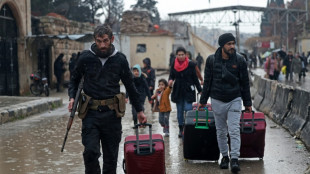 Syrian army says stopping Aleppo operations, but Kurds deny fighting over
Syrian army says stopping Aleppo operations, but Kurds deny fighting over
-
Thousands of Irish farmers protest EU-Mercosur trade deal

-
 Vonn storms to 84th World Cup win in Austrian downhill
Vonn storms to 84th World Cup win in Austrian downhill
-
Real Madrid not 'kamikaze' with Mbappe health: Alonso

-
 South Africa defends naval drills with Iran, Russia as 'essential'
South Africa defends naval drills with Iran, Russia as 'essential'
-
Alcaraz beats Sinner in sold-out South Korea exhibition match

-
 'Racing against time': Death toll rises after Philippines trash site collapse
'Racing against time': Death toll rises after Philippines trash site collapse
-
'American? No!' says Greenland after latest Trump threat

-
 New rallies in Iran as son of shah calls for city centres to be seized
New rallies in Iran as son of shah calls for city centres to be seized
-
Greenland's parties say they don't want to be under US

-
 Switzerland battle into United Cup final in searing Sydney heat
Switzerland battle into United Cup final in searing Sydney heat
-
Syrian army says swept Aleppo district after clashes with Kurdish fighters
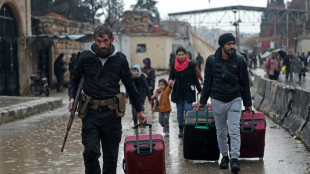
-
 Short-handed Thunder rally to edge Grizzlies
Short-handed Thunder rally to edge Grizzlies
-
Neighbors in Minneapolis protect each other from US immigration police

-
 Glenn tops Liu for US figure skating gold as American women eye Olympics
Glenn tops Liu for US figure skating gold as American women eye Olympics
-
Death toll climbs after trash site collapse buries dozens in Philippines

-
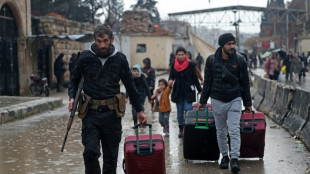 Syria urges Kurdish fighters to surrender after ramping up Aleppo operation
Syria urges Kurdish fighters to surrender after ramping up Aleppo operation
-
Sabalenka into third straight Brisbane final ahead of Australian Open

-
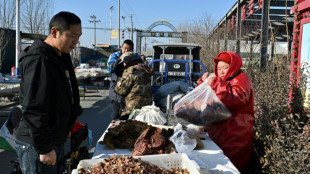 Chinese villagers struggle for heat as gas subsidies fade
Chinese villagers struggle for heat as gas subsidies fade
-
North Korea accuses South of another drone incursion

-
 Wrexham manager glad Ryan Reynolds on hand for heroics against Forest
Wrexham manager glad Ryan Reynolds on hand for heroics against Forest
-
Arrests reported, cross removed as China crackdown on unofficial churches grows


Afghan girls and women cling to glitchy, lonesome online learning
Sequestered at home in a remote Afghan town, 18-year-old Shekiba often roams the house hunting for the patchy internet signal that is her last link to an education.
Shekiba has turned to online learning since the Taliban returned to power in 2021 and shut her out of classrooms, signing up for live economics lectures she squints at on a pocket-sized phone screen.
She hopes to save for a laptop but is forced to buy expensive mobile data packages that still don't guarantee a signal in the town of Ishkashim perched high in mountainous Badakhshan province.
"If there were no internet issues, it would be much easier," she told AFP by phone. "But it's better to carry on, instead of sitting and doing nothing."
"I just hope to study, to succeed, to progress. If one person progresses in a family, the whole family progresses, as well as the whole society."
Boys and men returned to classes with the start of the Afghan new year, but girls and women will be left behind again by a Taliban government education blockade that is part of a raft of restrictions the United Nations has labelled "gender apartheid".
While online alternatives have sprung up, a dearth of computers and internet, as well as the isolation of learning via screen, makes them a poor substitute for in-person learning, students and teachers say.
Many of those alternatives also cannot provide diplomas, which offer a promise that qualifications will be acknowledged.
- 'No perspective of future' -
It's unclear exactly how many girls and women are involved in online learning, but two higher education platforms report Afghans registering or applying in the tens of thousands since the Taliban takeover.
Begum Academy, an online platform with some 8,500 free videos in Dari and Pashto covering the Afghan secondary school curriculum, launched in December 2023 and quickly had more than 3,000 users.
Director Hamida Aman said parents are grateful but it's hard for girls to stay driven.
"It's difficult to get motivated when everything is closed to you and there's no perspective of future," she told AFP from France, where she is based.
"These girls cannot have certificates, or they cannot have the ambition to go to the university or to have any job later."
Education for girls and women was a key aim of the US-backed government but gains were largely limited to cities, with only 23 percent of girls aged 13 to 18 in school nationwide, according to the International Crisis Group.
The think tank said that figure dropped to 13 percent after the Taliban government issued its edicts barring female education in 2022.
Zainab was soon to start high school when it came into effect and was twice rebuffed by an online school that was at capacity before she finally secured a place.
"Before taking online classes, we were idle at home. We were worried. We used to sleep most of the time, which made us depressed," said Zainab, who asked not to use her full name for fear of reprisal.
Online classes "keep us busy", she told AFP, but they "cannot replace schools".
Twenty-two-year-old Ruhila teaches English classes online while trying to continue her university education, also virtually, and says the teaching helps her spirits.
"The only thing that gives me energy in the current situation is teaching these girls," she said.
"But when you accept that it's going to be online forever then you lose enthusiasm and you don't put in the same effort," she said. "Mentally, online classes are very tough. They are stressful, and boring."
Taliban authorities have insisted since girls were barred from secondary school that they are working on establishing a system that aligns with their interpretation of Islamic law.
- Poor internet, few computers -
Widespread virtual schooling during the Covid-19 pandemic demonstrated it was "at best, a rather partial substitute for in-person instruction", a UNESCO report found.
Afghan students face the burden of trying to log on in a country where the internet is often down -- or painfully slow -- and where electricity outages are common.
Less than a quarter of the population uses the internet, according to online insights company DataReportal. With stark poverty rates in Afghanistan, computers are also a luxury many cannot afford.
Some 90 percent of Begum Academy students use their phones to learn, according to Aman.
But even more than those frustrations, 18-year-old Aisha misses the social aspect of school.
"Online classes cannot be as effective as physical classes where we meet our peers and our teachers and exchange our ideas," she said.
"Online courses can only give us a hope," she added. "But we can never say, 'I have studied online so I have graduated from school.'"
A.Jones--AMWN



